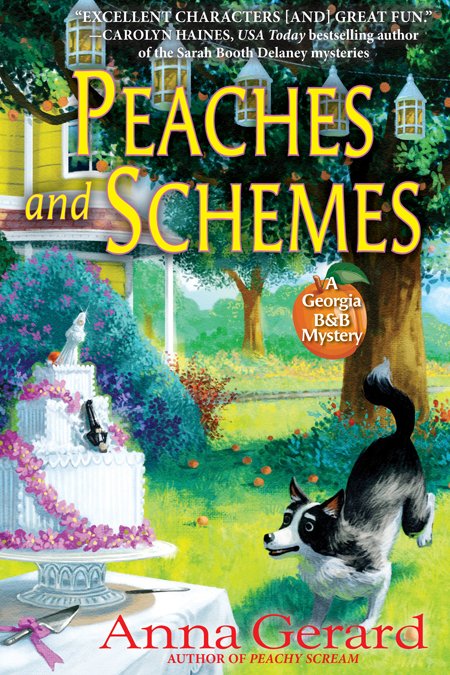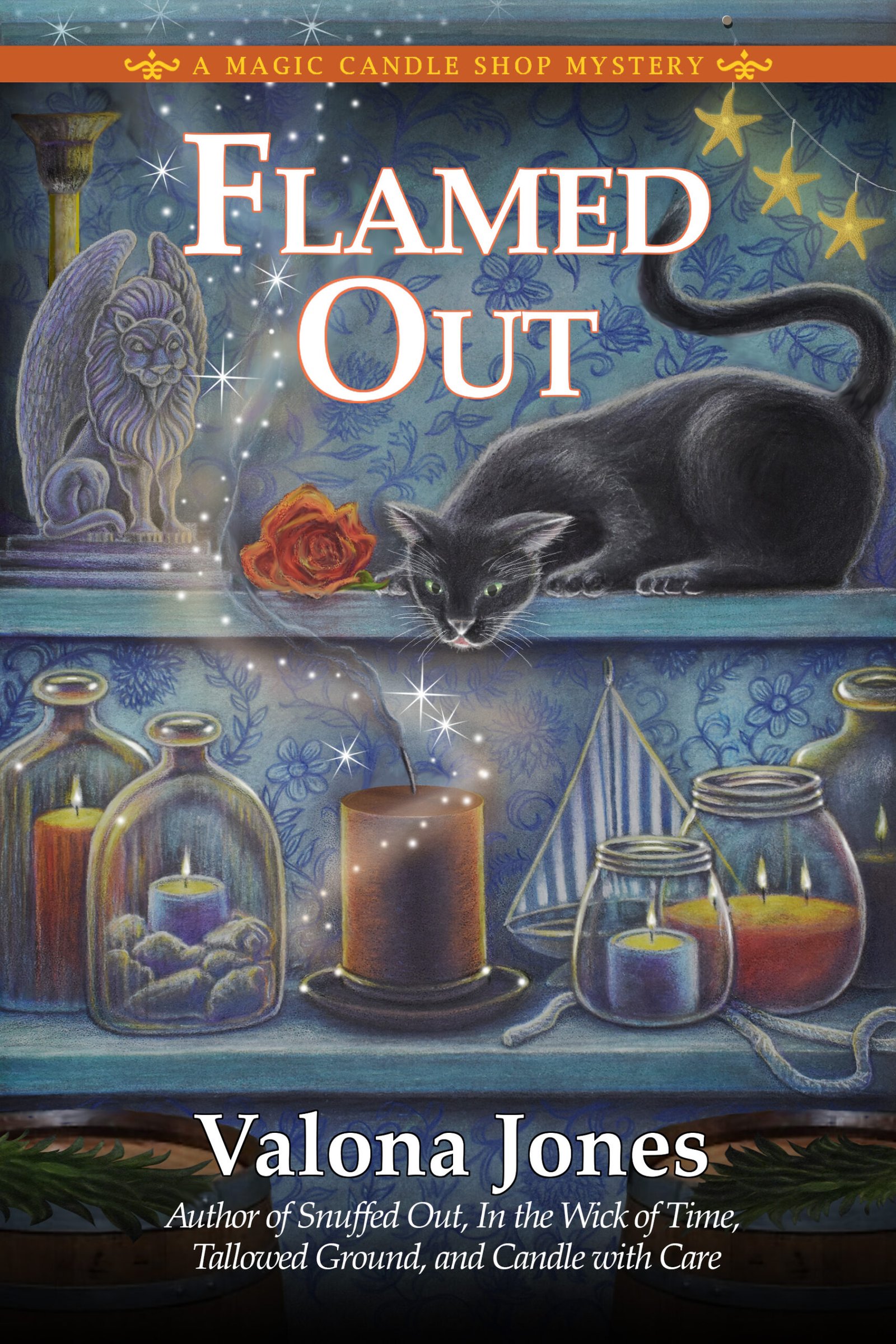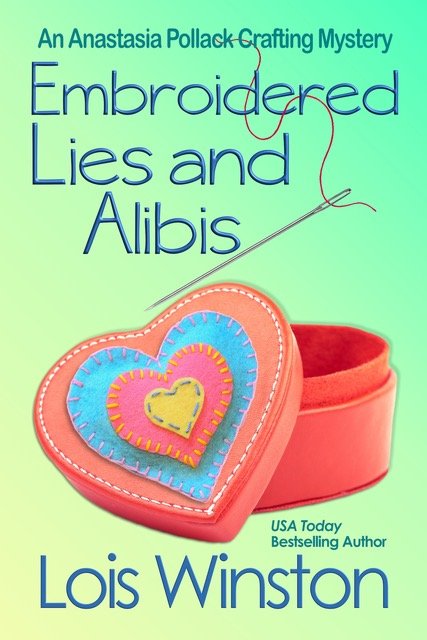Let's Talk with Lois Winston
Cliffhangers
 Early in my writing career I received a valuable piece of advice that I have always followed: Never end a chapter with your character going to sleep.
Early in my writing career I received a valuable piece of advice that I have always followed: Never end a chapter with your character going to sleep.
As an author, you never want to give your readers a reason to close your book. You want them to get to the end of the chapter and be so involved in your story that, no matter how tired they are, they absolutely, positively must turn the page to find out what happens next. This is known as the chapter-ending hook.
The chapter-ending hook is a great way to keep your readers turning pages, but what happens when they come to the last page of your book? If you’re writing a series, you want readers to pick up the next book in the series. One way to do this is to employ a cliffhanger ending.
The cliffhanger format was used with much success in the early days of cinema. Along with two weekly feature films, theaters would screen serials, longer movies that were broken up into weekly episodes. Each episode would end with the hero or heroine facing imminent death. Common scenarios included, among others, the hero or heroine dangling over the edge of a cliff (a literal cliffhanger and source of the term,) trapped in a burning building, tied to railroad tracks as a train steamed toward them, unconscious in a plummeting airplane, or bound to a chair and staring helplessly at a lit stick of dynamite. Moviegoers would have to return the following week to see if they escaped in the nick of time. They did, of course, but only to be plunged into a new peril at the end of that episode.
Cliffhangers have continued to be popular, especially in TV shows where it’s common to end a season leaving viewers guessing what happens next. Only with television shows, fans have to wait months, rather than a mere week.
Cliffhangers have been around long before television and movies, though. In Homer’s Odyssey, book four ends with an ambush being set for Odysseus’s son Telemachus, but readers don’t learn what happens to Telemachus until nearly the end of the next book.
As a writer of a mystery series, along with wanting readers to keep turning the pages of my books to find out what happens next, I want them to buy my next book, along with every other book in the series, as I continue to publish them. One way I do this is to employ a cliffhanger at the end of each book in the series.
Of course, I don’t keep the reader hanging as to the identity of the killer. I know that every book must have a resolution to the plot, and by the end of each of my books, my amateur sleuth has figured out whodunit. Mystery readers don’t want to get to the end of a book to find the murder hasn’t been solved or the killer hasn’t been caught. That’s a surefire way to lose readers.
However, I take a page from old movie serials by setting up the next book at the end of the preceding one. I do this with ongoing character arcs. My books end with a cliffhanger of sorts involving one of the continuing characters in the series. It may be an emotional cliffhanger rather than a physical one, but there are all sorts of cliffhangers. I’d give you examples, but I’m not one to supply spoilers of my own books. I’d rather have you read the books to find out for yourself. (How’s that for a cliffhanger ending to this article?)
How do you feel about cliffhangers? Post a comment for a chance to win an audiobook of your choice of either Death by Killer Mop Doll or Revenge of the Crafty Corpse, the second and third books in my Anastasia Pollack Crafting Mystery Series.
While you’re here, visit our contest page. Our giveaway is collecting entries from March 1-18. There are multiple ways to enter to add to your chances to win. The winner will select one of the books from the contest graphic. More contest info on that page. CLICK HERE for more info.
Want to know more about author Lois Winston? Visit her website.
Posted in Let's Talk, with Lois Winston • Tags: Cliffhangers, Let's Talk, Lois Winston | 34 Comments








I used to hate cliffhangers but some I have found serve as a good entrance into the series of books
Thanks for stopping by and commenting, Crystal.
Excellent topic. I, too, sometimes employ an emotional cliffhanger at the end of a book, such as an impending change in a character’s life. Readers will want to know what happens next and have to get the sequel to find out. Nonetheless, I conclude each book with the murderer caught and a happy ending.
Exacty, Nancy!
I don’t mind cliffhangers. Leaves you looking forward to the next in series book.
Glad to hear this! You’re my kind of reader!
I make a real effort to leave something hanging at the end of every chapter. I love this famous quote:
“The first chapter sells the book; the last chapter sells the next book.”
— Mickey Spillane
Such a great quote, Cheryl!
Don’t like them.
So sorry to hear this, Dru. 🙁
Good blog, Lois.
Thanks, Mary!
Mostly I avoid cliffhangers. A tease for the next book is entirely different from a cliffhanger though.
I think it depends on the type of tease and type of cliffhanger, Maria, especially when it has to do with characters’ lives and not plot.
As a writer I love writing cliffhangers at the end of each chapter and even at the end of the book, since I write series. Great blog post, Lois.
Thanks, Kathleen!
I hate when books are story cliffhangers (aka half a story), but finishing one arc and opening another gets me excited for the next book.
That’s my point, Jen. I would never suggest an author end a books without resolving the plot. There’s a series out now that’s doing exactly that. The murder occurred in the first book, and after the second book still hadn’t been resolved. I think that’s cheating the reader.
I love the way you explained that, Lois. You have everything laid out in such a way that the information works for readers and authors. As an author I love cliffhangers. I want to make sure people keep turning the pages or eagerly awaiting the next book in the series. As a reader, I get impatient for the next book to come out! But I blow through a book so fast needing to know what comes next that I often read brand new books twice, back-to-back so that I can savor all parts of the book, not just the plot! Again, great job on this!
Thanks, Maggie!
I love it when a chapter leaves me with a question that makes me want to move on to the next chapter. If I were reading a book in a series and the main plot wasn’t resolved, I’d be upset with the author.
Terry, that’s the way I felt in that one series I mentioned in my reply to Jen. I picked up the series with the second book, something I don’t normally do, but I was asked to write a review. I felt completely lost. The author made little attempt to clue the reader in to who the characters were or much about the murder that had occurred in the earlier book, except that the killer still hadn’t been caught. Then she didn’t resolved the murder by the end of the second book.
I leave a cliff hanger of sorts at the end of a book in a series.
I remember some of those, Marilyn!
I enjoy series really because there usually are cliffhangers that make me happily anticipate the next book in the series.
A reader after my own heart, Linda. Thanks for stopping by.
I’m team “cliffhangers at the end of the chapter are great”, but you’d better resolve the main storyline (in our case, murder) by the end of the book or that’s the last you’ll see of me! But I like as a reader and a writer picking up threads from what were unresolved and relatively minor subplots in book 1 and continuing them into book 2, with one of them becoming the main plot. And so on through the series.
Yes, that murder better be solved by the end of the book, Diane!
I personally do not care for cliffhangers. It really depends on how they are written.
That’s true of everything, isn’t it, Clara? 😉
Thanks for stopping by and commenting.
Great topic, Lois. I use cliffhangers at the end of chapters to encourage my readers to keep turning those pages. They need to be handled carefully, however, so the storyline doesn’t seem completely contrived. A little tease at the end of a book, even if it’s on a new side story, is a great way to interest them in the next.
That’s true, Judy. One of the ways I employ cliffhangers at the end of a chapter is to break a scene up between the two chapters.
I like for chapter cliff hangers to be organic. I’ve read a lot of contrived ones. Maybe it’s my limited skills, but I like a chapter to end where it ends—maybe a cliffhanger, maybe a sex scene, maybe foreshadowing, maybe a smart-ass comment by my MC.
Contrived is never good, Candace. 😉